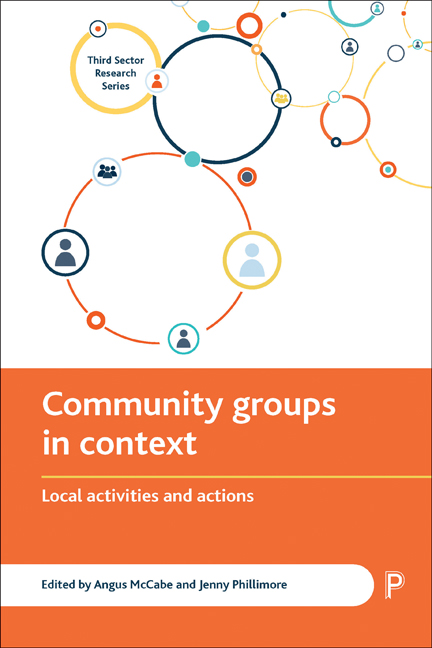Book contents
- Frontmatter
- Contents
- List of tables and figures
- Foreword
- Series editor’s foreword
- Acknowledgements
- Notes on contributors
- Introduction Why get below the radar? The importance of understanding community groups and activities
- Part One Scoping and mapping community actions and activities
- Part Two Community groups and activities in context
- Part Three Under-explored radars
- Part Four Thinking about voice, learning and emotion below the radar
- Index
three - Are we different? Claims for distinctiveness in voluntary and community action
Published online by Cambridge University Press: 05 April 2022
- Frontmatter
- Contents
- List of tables and figures
- Foreword
- Series editor’s foreword
- Acknowledgements
- Notes on contributors
- Introduction Why get below the radar? The importance of understanding community groups and activities
- Part One Scoping and mapping community actions and activities
- Part Two Community groups and activities in context
- Part Three Under-explored radars
- Part Four Thinking about voice, learning and emotion below the radar
- Index
Summary
Chapter aims
Drawing on 126 interviews with community activists, this chapter critically examines:
• how and why community groups come into existence and are sustained;
• whether claims for the distinctiveness of community groups and activities are justified;
• the function of social networks in community action.
Background
The literature on the voluntary and community sector is littered with claims of its distinctiveness – if not uniqueness. Unlike the private sector, voluntaries are not motivated by profit. Whereas the statutory sector is bureaucratic, and allegedly slow to act, voluntary organisations are fleet of foot, adaptable and responsive. The sector is, at least in principle, value driven (Corry, 2011), guided by concepts of cooperation and solidarity (Warren, 2001) and working for community cohesion and strengthening local networks of care (Edwards, 2008).
Debate on the distinctiveness of the sector, has, however, shifted in the past decade, as has the language used to describe the sector: from the generic ‘voluntary organisations’ to the idea of a voluntary, then third, sector and on to a more amorphous concept of civil society. At the same time, the idea that the sector exists as a cohesive whole has been called into question:
Internal diversity has been incorporated into the presentation of a sector constructed with a breadth and profile to stand alongside, and even to challenge, the public and private sectors…. [However] different agendas mean that the notion of a third sector is inevitably a contested one, and may lead some to challenge the relevance of the concept itself. (Alcock, 2010, pp 1, 4)
Billis (2010) goes further and argues that (at least some) voluntary and community organisations have moved towards more hybrid modes of operation: espousing the values of voluntarism while becoming more bureaucratic or business-like. Further, following the 2008 global financial crisis and the subsequent recession, austerity measures and cuts to public funding in the UK, there are those who argue that the core values that may have been used to define the sector's distinctiveness have been eroded and that there are now (at least) two different sectors, divided between the haves (large charities) and the have-nots (community groups).
- Type
- Chapter
- Information
- Community Groups in ContextLocal Activities and Actions, pp. 51 - 70Publisher: Bristol University PressPrint publication year: 2017



